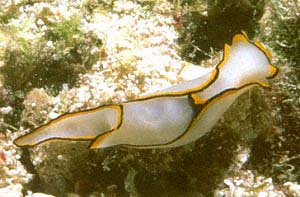
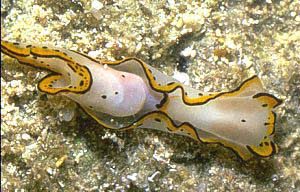
Chelidonura pallida
Risbec, 1951.
Order: CEPHALASPIDEA
Family: Aglajidae
DISTRIBUTION
Known from New Caledonia and Western Australia.
PHOTO
UPPER: Ashmore Reef, Western Australia, April 1986.
LOWER: Rottnest Island, Western Australia.
PHOTOS: Clay Bryce.
Similar in colour to Chelidonura electra, but that species has no black markings, and the left "tail" is much fleshier.
Reference:
• Risbec, J., (1951). Notes sur les Tectibranches de Nouvelle-Calédonie. Journal de la Société des Océanistes, 7(7): 123-158.
Rudman, W.B., 1998 (October 14) Chelidonura pallida Risbec, 1951.. [In] Sea Slug Forum. Australian Museum, Sydney. Available from http://www.seaslugforum.net/find/chelpall
Related messages
Re: Chelidonura pallida in Malaysia
July 31, 2007
From: Nur Leena Wong
Concerning message #20254:
Hi Bill,
Thanks! I did not realise there are actually 2 animals since I thought they mate like other nudibranchs (facing oppasite direction).
Can I say it is a rare species or uncommon species?
Thanks again,
Leena
halosin78@yahoo.com
Wong, N. L., 2007 (Jul 31) Re: Chelidonura pallida in Malaysia. [Message in] Sea Slug Forum. Australian Museum, Sydney. Available from http://www.seaslugforum.net/find/20323Dear Leena,
It's a bit hard using terms like 'rare' and 'uncommon'. If we don't know where an animal lives then we should say 'rarely found' as the species may be extremely common in their normal habitat. As you'll see if you read the messages on various species of Chelidonura on the Forum, a species can be found in great abundance for a short period and then be absent so it goes from being abundant to rare in a few weeks. So if I say Chelidonura pallida appears to be uncommon what I am really saying is we don't have many records of it which might mean its rare or it might mean we don't know where it lives.
Best wishes,
Bill Rudman
Chelidonura pallida in Malaysia
July 26, 2007
From: Nur Leena Wong
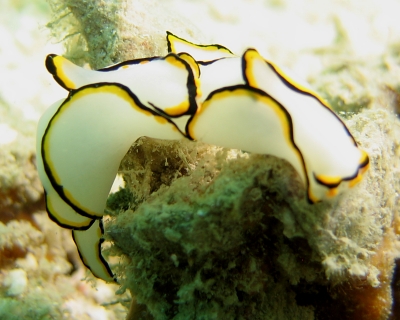
Hi,
I found this Chelidonura pallida in Tioman Island, Malaysia last month (June 2007) in an undisturbed dive site. I was surprised to find it since this is the first time I saw it after more than 80 dives around Malaysia. Just want to share with you.
Locality: Tioman Island, 18m, Malaysia, South China Sea, 2 June 2007, sand. Photographer: Nur Leena Wong.
Thanks.
Leena
halosin78@yahoo.com
Wong, N. L., 2007 (Jul 26) Chelidonura pallida in Malaysia. [Message in] Sea Slug Forum. Australian Museum, Sydney. Available from http://www.seaslugforum.net/find/20254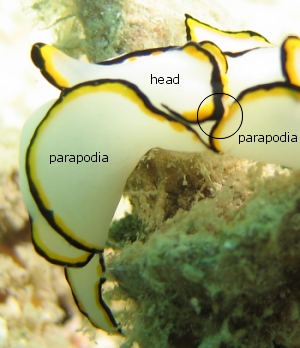
Dear Leena,
Thanks for the record. This species does seem to be as common as some other species of Chelidonura so new records are very welcome. I am not sure if you realised, but your animal is in fact two animals mating. In the photo alongside I have labelled the head of the posterior animal and the right parapodia of each animal. Aglajids, like Chelidonura pallida, are similar to sea hares in their mating behaviour [see mating chains ], because their penis is on the right side of the head, quite separate from the female part of their genital organs which are on the right side of the body about halfway back in the mantle cavity. [I have ringed the region in your photo]. If you look at the photos and messages on Chelidonura varians you will find quite a few reports on mating and egg laying.
Best wishes,
Bill Rudman
Chelidonura pallida from the Andaman Sea
January 26, 2007
From: Danny van Belle
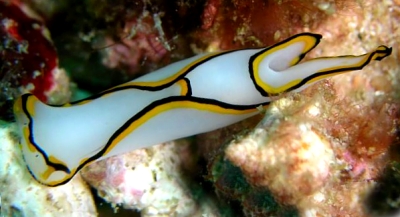
I think this is an interesting find for the Andaman sea area. I think it's Chelidonura pallida.
Locality: Bungalow bay, Racha Yai isl., 12 m, Thailand, Indian ocean, 21 februari 2006, Sand bottom next to the reef. Length: 2 cm. Photographer: Danny van Belle.
Danny van Belle
danny.van.belle@skynet.be
Van Belle, D., 2007 (Jan 26) Chelidonura pallida from the Andaman Sea. [Message in] Sea Slug Forum. Australian Museum, Sydney. Available from http://www.seaslugforum.net/find/19282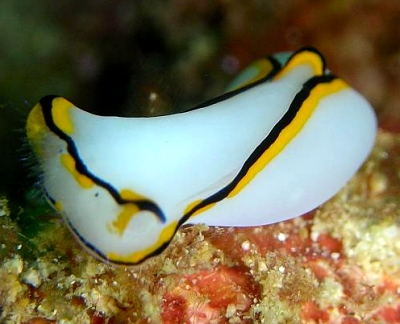
Dear Danny,
Yes this is an interesting find. We don't know a lot about this species, so any new information is welcome.
Your close-up of the head shows the chemo-sensory 'sensory bristles' on mounds on each side of the mouth. We thinks there are used to sense prey or the mucous trails of the flatworms species of Chelidonurafeed on.
Best wishes,
Bill Rudman
Chelidonura pallida from Indonesia
May 11, 2005
From: Roberto Sozzani
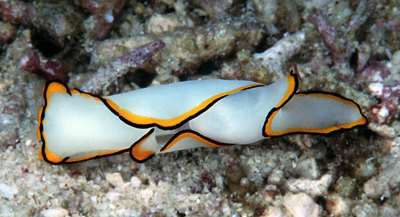
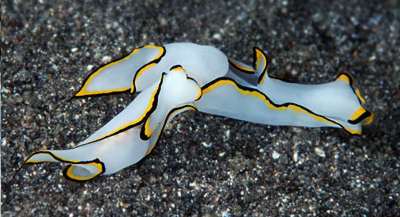
Dear Bill,
I have some records of Chelidonura pallida to add to the Forum.
The first photo is from Rinja island, the second from Manado.
As Linda Ianiello has found [message #10807], most of my findings of this species were also in black volcanic sand. I must add that I never considered this species a rare finding in Indonesia: not common as Chelidonura amoena, but still easy to see on black sand.
Locality: Rinja Island and Manado, Indonesia. Depth: 12-15 metres. Length: 5 cm. March 2003. Black sand and sandy slope. Photographer: Roberto Sozzani
Best regards
Roberto Sozzani
roberto.sozzani@fastwebnet.it
Sozzani, R., 2005 (May 11) Chelidonura pallida from Indonesia. [Message in] Sea Slug Forum. Australian Museum, Sydney. Available from http://www.seaslugforum.net/find/13743Dear Roberto,
Thanks for the records. One value of the Forum is to give us a chance of building up a better idea of just how common, various species are. Enormous private and public shell collections have enabled us over time to build a quite good understanding of the geographic distribution of many shelled molluscs and to gain an understanding of just how common individual species are. Unshelled molluscs, such as the sea slugs, are quite a different story. Collections of any value are much more difficult to accumulate, because preserved specimens of one species look much like those of another. To be of value, specimens need to be properly fixed and preserved when collected, and accompanied by information on their living shape and colour such as drawings, field notes, paintings and more recently colour photographs. In many ways, colour photographs are as valuable in sea slug research as shells are in 'snail research'.
Best wishes,
Bill Rudman
Chelidonura pallida from Western Australia
May 10, 2005
From: Sascha Hofmann
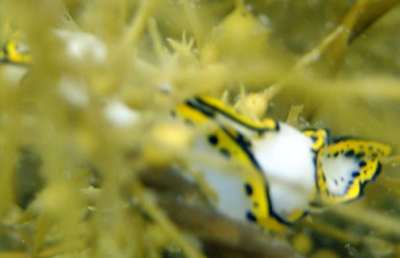
Hi,
After a long search on the net I finally found the nudibranch in my photo.
Can you confirm this is a Chelidonura pallida?
As I understood from the description this species is not sighted very often so here are the details of the sighting.
Locality: Little Armstrong Bay, Rottnest Island, off Perth, Western Australia.Depth: between 5 to 8 meters. Length: 50 mm. 11 January 2005. Photographer: Sascha Hofmann
Sascha Hofmann
http://hofmann.demon.nl
Netherlands
sascha@hofmann.demon.nl
Hofmann, S.W., 2005 (May 10) Chelidonura pallida from Western Australia. [Message in] Sea Slug Forum. Australian Museum, Sydney. Available from http://www.seaslugforum.net/find/13731Dear Sascha,
Yes this is Chelidonura pallida. It is interesting that this is the second message in a few days showing an unusual colour form - in this case black spots [see message #13655].
Best wishes,
Bill Rudman
Is this Chelidonura pallida?
April 28, 2005
From: Alphonsus Jude Joseph
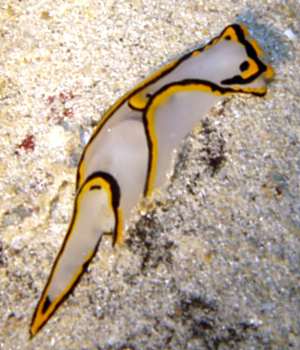
Hi Bill,
Was wondering if this is Chelidonura pallida?
Locality: Salang Tioman, Malaysia, South China Sea. Depth: 18 m. Length: 5 cm. 24 July 2004. Under Jetty on Bottle. Photographer: Alphonsus Jude Joseph.
Alphonsus Jude Joseph.
alphonjj@magix.com.sg
Joseph, A.J., 2005 (Apr 28) Is this Chelidonura pallida?. [Message in] Sea Slug Forum. Australian Museum, Sydney. Available from http://www.seaslugforum.net/find/13655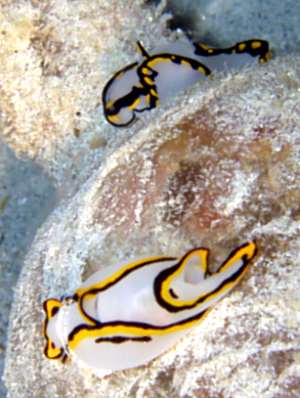
Dear Alphonsus,
This is indeed Chelidonura pallida. This seems to be quite a rare species, or at least rarely seen species so its good to get some more information on variability in is colour pattern. In your photo alongside I guess the animal on the neck of the bottle is also Chelidonura. I can't make out its shape very cleaely and I have never seen a specimen in which the yellow lines are reduced to a series of yellow spots in the black band.
Best wishes,
Bill Rudman
Chelidonura pallida from Indonesia
August 25, 2003
From: Linda Ianniello
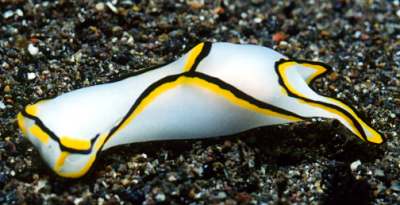
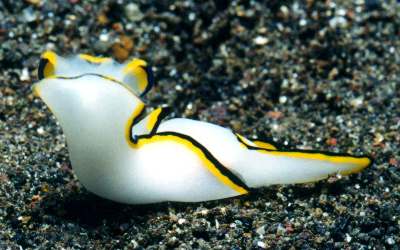
Dr. Bill,
These are my favorites from my recent trip to Indonesia; they are so striking against the dark sand. Here are two shots of Chelidonura pallida to add to the Forum.
Date: August, 2003
Dive Site: Black Magic at Sangeang Island
Depth: 40 feet
Length: about 2 inches
Regards,
Linda I.
lindai@us.ibm.com
Ianniello, L., 2003 (Aug 25) Chelidonura pallida from Indonesia. [Message in] Sea Slug Forum. Australian Museum, Sydney. Available from http://www.seaslugforum.net/find/10807Thanks Linda,
This is a nice find. This species seems to be one of the less common species of Chelidonura so it is useful to get a range of records showing its colour varaition and geographic distribution. Your trip to Indonesia seems to have been quite productive
Best wishes,
Bill Rudman
Chelidonura pallida from Japan
July 2, 2003
From: Atsushi Ono
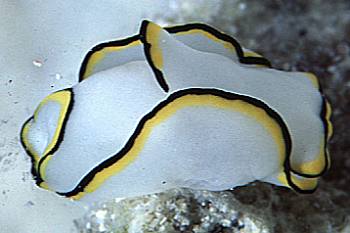
Dear Bill,
Thank you for your comment on my message about "yellow spotted Cheidonura". In a separate message I have sent photos showing variation in Chelidonura amoena and hhere is a photo of Chelidonura pallida, with a "short tail" from Kerama Is. Okinawa Japan, which appeared in my Kerama Islands Book.
Sincerely,
Atsushi Ono
ononini@cosmos.ne.jp
Ono, A., 2003 (Jul 2) Chelidonura pallida from Japan. [Message in] Sea Slug Forum. Australian Museum, Sydney. Available from http://www.seaslugforum.net/find/10201Thanks Atsushi,
Your messages on variability in Chelidonura are very valuable. I'm sorry we can't answer all your questions, but your messages are certainly helping us to better understand these animals.
Best wishes
Bill Rudman
